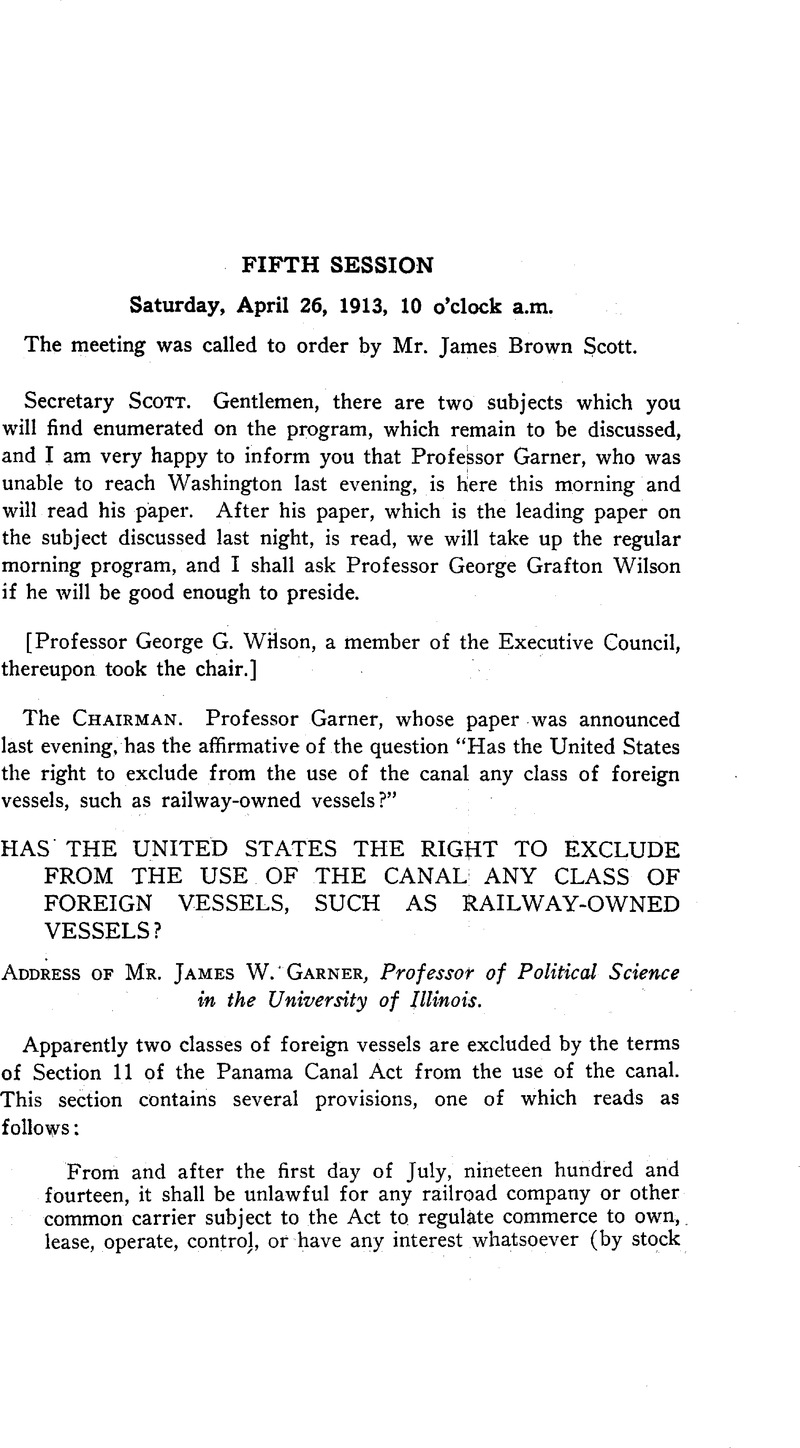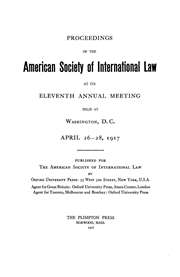No CrossRef data available.
Article contents
Has the United States the right to exclude from the use of the Canal any class of foreign vessels, such as railway-owned vessels?
Published online by Cambridge University Press: 27 February 2017
Abstract

- Type
- Fifth Session
- Information
- Proceedings of the American Society of International Law at its annual meeting (1907-1917) , Volume 7 , 1913 , pp. 199 - 212
- Copyright
- Copyright © American Society of International Law 1913
References
1 The Committee on Interstate and Foreign Commerce in its report of March 16, 1912, on the Panama Canal Act, thus stated the purpose of the provision : “The apprehension of railroad-owned vessels driving competition from the canal may or may not be exaggerated, but it is certain that the evil, which is only anticipated there) already exists in the coastwise trade on both coasts,as well as on our lakes and rivers. The evil is prevalent, recognized, and complained of. The proper function of a railroad corporation is to operate trains on its tracks, not to occupy the waters with ships in mock competition with itself, which in reality operate to the extinction of; all genuine competition. In answering demands for the exclusion of railroad-owned ships from the canal, which in this bill or any other would simply amount to an amendment of the Act to regulate commerce, the committee thinks it wise, just, and opportune to broaden the amendment so as to serve the higher, wider, more pressing,and more necessary purpose of excluding the railroads from operating vessels in competition with their tracks anywhere in the coastwise trade generally or in the lakes and rivers.” See also the Congressional Record, 62nd Congress,2nd Session, pp. 1896, 10556, 10557.
2 Hearings before the Committee on Interstate and Foreign Commerce, H.R. Doc. No. 680, 62nd Cong., 2nd Sess., p. 505.
3 Congressional Record, May 16, 1912, 62nd Cong., 2nd Sess., p. 6594; also May 18, p. 6752.
4 Congressional Record, 62nd Cong., 2nd Sess., p. 10574.
5 See his remarks in the Congressional Record, 62nd Cong., 2nd Sess., pp. 6922, et seq. Representative Adamson, Chairman of the House Committee on Interstate and Foreign Commerce, informs me that he drafted this provision of Section 11 and that he intended it to apply to all railroad-owned vessels engaged in competitive traffic, whether they were foreign or domestic. Representative Esch, another member of the committee, also informs me that the prohibition as interpreted by him applies to all Canadian roads which are subject to the Interstate Commerce Act the same as to domestic roads and that this was the understanding of the majority of the committee.
6 The House Committee on Merchant Marine and Fisheries asserted, in a report made a year ago, that over 90 per cent of the foreign trade of the United States was carried by foreign ships “that belong to rings, pools and combinations, and that between the steamship lines composing these combinations, there was absolutely no competition.” Report No. 632, 62nd Congress, 2nd Session.
7 Congressional Record, 62nd Cong., 2nd Session, pp, 7561–7563.
8 Ibid., p. 7563.
9 One of these cases is that of the United States versus the Prince Line, the Lamport and Holt Line, and the Hamburg-American Lines; the other is that of the United States versus the American-Asiatic, the Anglo-American Oil Line, the United States and China-Japan Line, and American-Oriental Line,the Barber and Dodwell Line, the American-Manchurian Line and the Isthmian Line. All these are foreign corporations except two.
10 Article 1 of this treaty reads as follows: “There shall be between the territories of the United States of America, and all the territories of His Britannick Majesty in Europe, a reciprocal liberty of commerce. The inhabitants of the two countries, respectively, shall have liberty freely and securely to come with their ships and cargoes to all such places, ports and rivers, in the territories aforesaid, to which other foreigners are permitted to come, to enter into the same, and to remain and reside in any parts of the said territories, respectively; also to hire and occupy houses and warehouses for the purposes of their commerce; and, generally, the merchants and traders of each nation respectively shall enjoy the most complete protection and security for their commerce, but subject always to the laws and statutes of the two countries, respectively.”
11 Proceedings in the North Atlantic Fisheries Arbitration, Vol. 4, pp. 36-37,Senate Doc. No. 870, 61st Cong., 3rd Sess. Speaking of the American contention, Mr. Hall W. E. remarks (International Law, 5th ed., p. 339) : “In other words, it was contended that the simple grant to foreign subjects of the right to enjoy certain national property in common with the subjects of the state carries with it by implication an entire surrender, in so far as the property in question is concerned, of one of the highest rights of sovereignty, viz., the right of legislation. That the American Government should have put forward the claim is scarcely intelligible. There can be no question that no more could be demanded than that American citizens should not be subjected to laws or regulations,either affecting them alone, or enacted for the purpose of putting them at a disadvantage.”
12 Proceedings in the North Atlantic Coast Fisheries Arbitration, Vol. 1, p. 85. See also an article by Robert Lansing, AMERICAN JOURNAL of INTERNATIONAL LAW, January, 1911, pp. 1,et seq.
13 Congressional Record, 62nd Cong., 2nd Sess., p. 6752.
14 Ibid., p. 6922.


